|
|
|
Sort Order |
|
|
|
Items / Page
|
|
|
|
|
|
|
| Srl | Item |
| 1 |
ID:
165128
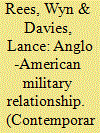

|
|
|
|
|
| Summary/Abstract |
The Anglo-American military relationship is a vital yet neglected area of study. This article argues that the British military have actively cultivated a relationship with the U.S. military that has contributed to the longevity of the broader so-called “Special Relationship,” even in the Trump era. The article contends that the complexities of the military relationship can best be captured by the theoretical lens provided by Lowndes and Roberts that combines different strands of institutionalism to focus on rules, practices, and narratives. The intense linkages between the United States and United Kingdom have become routinized, enabling them to adapt their peacetime cooperation to conflicts, and thereby address post-Cold War security challenges. The article draws upon semi-structured interviews with senior British military officers as well as policy documents to explore how these patterns of collaboration have become ingrained in patterns of both thinking and behavior.
|
|
|
|
|
|
|
|
|
|
|
|
|
|
|
|
| 2 |
ID:
165131


|
|
|
|
|
| Summary/Abstract |
Cyberspace experiences worrying trends that could have a negative impact on the international strategic landscape. The lack or erosion of norms and risky practices and behaviors could lead to greater uncertainty and thus greater instability. Set against a context of renewed competition between great powers, these developments are also tied to the strategic structure of cyberspace. This forum is devoted to discussing factors leading to stability or and instability.
|
|
|
|
|
|
|
|
|
|
|
|
|
|
|
|
| 3 |
ID:
165133
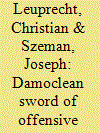

|
|
|
|
|
| Summary/Abstract |
Cyberspace is a new domain of operation, with its own characteristics. Cyber weapons differ qualitatively from kinetic ones: They generate effects by non-kinetic means through information, technology, and networks. Their properties, opportunities, and constraints are comparable to the qualitative difference between conventional and nuclear weapons. New weapons and their target sets in a new domain raise a series of unresolved policy challenges at the domestic, bilateral, and international levels about deterrence, attribution, and response. They also introduce new risks: uncertainty about unintended consequences, expectations of efficacy, and uncertainty about both the target’s and the international community’s response. Cyber operations offer considerable benefits for states to achieve strategic objectives both covertly and overtly. However, without a strategic framework to contain and possibly deter their use, make state and non-state behavior more predictable in the absence of reciprocal norms, and limit their impact, an environment where states face persistent attacks that nonetheless fall below the threshold of armed conflict presents a policy dilemma that reinforces collective insecurity.
|
|
|
|
|
|
|
|
|
|
|
|
|
|
|
|
| 4 |
ID:
165132
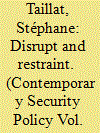

|
|
|
|
|
| Summary/Abstract |
In the last decade, cyber conflict has become a main feature of international politics and a growing concern for strategic stability and collective security. Unfortunately, cyber conflict suffers from a lack of conceptual clarity about its impact on collective security and a lack of consensus among international actors on how to interpret it. This article proposes to understand cyber conflict as an evolving process driven by two factors: the way in which digital space is configured and the way in which tactical, organizational, strategic, and doctrinal characteristics related to cyber have been included in the field of national and international security. Both tend to encourage offensive behavior but also demonstrate features pointing to restraint.
|
|
|
|
|
|
|
|
|
|
|
|
|
|
|
|
| 5 |
ID:
165129
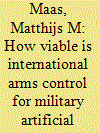

|
|
|
|
|
| Summary/Abstract |
Many observers anticipate “arms races” between states seeking to deploy artificial intelligence (AI) in diverse military applications, some of which raise concerns on ethical and legal grounds, or from the perspective of strategic stability or accident risk. How viable are arms control regimes for military AI? This article draws a parallel with the experience in controlling nuclear weapons, to examine the opportunities and pitfalls of efforts to prevent, channel, or contain the militarization of AI. It applies three analytical lenses to argue that (1) norm institutionalization can counter or slow proliferation; (2) organized “epistemic communities” of experts can effectively catalyze arms control; (3) many military AI applications will remain susceptible to “normal accidents,” such that assurances of “meaningful human control” are largely inadequate. I conclude that while there are key differences, understanding these lessons remains essential to those seeking to pursue or study the next chapter in global arms control.
|
|
|
|
|
|
|
|
|
|
|
|
|
|
|
|
| 6 |
ID:
165130
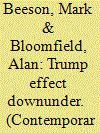

|
|
|
|
|
| Summary/Abstract |
Donald Trump’s election precipitated a debate in Australia about the value of retaining close alliance ties with the United States. Similar dynamics are discernible in other U.S. allies as the negative impact of Trump administration policies becomes clearer. Yet despite this “Trump effect,” we argue Australia is unlikely to distance itself from the United States because at the core of Australia’s strategic culture is a very positive “cultural orientation” toward the United States that is highly institutionalized in treaties, formal bilateral ties, Track 2 diplomacy, and public opinion. Such institutionalized ties have powerful path dependent effects. Accordingly, we conclude that the Trump effect does not constitute a powerful enough “exogenous shock” to move Australia off its well-worn grand-strategic path. But this alliance relationship is marked by both high cultural affinity and high institutionalization: American policy-makers should seriously consider whether other U.S. allies can tolerate similar levels of “stress.”
|
|
|
|
|
|
|
|
|
|
|
|
|
|
|
|
|
|
|
|
|